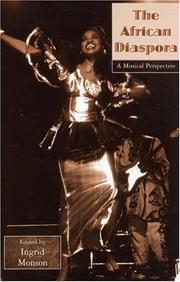| Listing 1 - 10 of 10 |
Sort by
|

ISBN: 0226534774 0226534782 9780226534770 9780226534787 Year: 1996 Publisher: Chicago : The University of Chicago Press,
Abstract | Keywords | Export | Availability | Bookmark
 Loading...
Loading...Choose an application
- Reference Manager
- EndNote
- RefWorks (Direct export to RefWorks)
821 --- Jazz en lichte muziek - Theorie van de jazz --- USA. --- Improvisation (Music) --- Jazz --- Extemporization (Music) --- Music --- History and criticism --- Performance --- Improvisaties --- Muzieksociologie --- Jazz.

ISBN: 113817789X 1135885737 128005753X 0203493052 9780203493052 9786610057535 6610057532 9780415967693 0415967694 0415967694 9781135885687 9781135885724 9781138177895 1135885729 1604562048 Year: 2016 Publisher: New York, NY ; London : Routledge,
Abstract | Keywords | Export | Availability | Bookmark
 Loading...
Loading...Choose an application
- Reference Manager
- EndNote
- RefWorks (Direct export to RefWorks)
The African Diaspora presents musical case studies from various regions of the African diaspora, including Africa, the Caribbean, Latin America, and Europe, that engage with broader interdisciplinary discussions about race, gender, politics, nationalism, and music.
Blacks --- Music --- Negroes --- Ethnology --- History and criticism. --- Black persons --- Black people

ISBN: 9780415967693 0415967694 Year: 2003 Publisher: New York ; London : Routledge,
Abstract | Keywords | Export | Availability | Bookmark
 Loading...
Loading...Choose an application
- Reference Manager
- EndNote
- RefWorks (Direct export to RefWorks)
Blacks --- Music --- Noirs --- Musique --- History and criticism. --- Histoire et critique --- 78.31 --- Black people
Book
ISBN: 9780199757091 0199757097 Year: 2010 Publisher: New York ; Oxford : Oxford University Press,
Abstract | Keywords | Export | Availability | Bookmark
 Loading...
Loading...Choose an application
- Reference Manager
- EndNote
- RefWorks (Direct export to RefWorks)
An examination of the impact of the civil rights movement and African independence on jazz in the 1950s and 60s, this text traces the complex relationships between music, politics, aesthetics, and activism through the lens of racial and economic issues.
African Americans --- Jazz --- Jazz. --- Civil rights --- History --- Civil rights. --- History and criticism --- Political aspects --- Social aspects --- Social aspects. --- 1900-1999. --- United States.
Book
ISBN: 128207007X 9786612070075 0226534790 Year: 1996 Publisher: Chicago : University of Chicago Press,
Abstract | Keywords | Export | Availability | Bookmark
 Loading...
Loading...Choose an application
- Reference Manager
- EndNote
- RefWorks (Direct export to RefWorks)
This fresh look at the neglected rhythm section in jazz ensembles shows that the improvisational interplay among drums, bass, and piano is just as innovative, complex, and spontaneous as the solo. Ingrid Monson juxtaposes musicians' talk and musical examples to ask how musicians go about "saying something" through music in a way that articulates identity, politics, and race. Through interviews with Jaki Byard, Richard Davis, Sir Roland Hanna, Billy Higgins, Cecil McBee, and others, she develops a perspective on jazz improvisation that has "interactiveness" at its core, in the creation of music through improvisational interaction, in the shaping of social communities and networks through music, and in the development of cultural meanings and ideologies that inform the interpretation of jazz in twentieth-century American cultural life. Replete with original musical transcriptions, this broad view of jazz improvisation and its emotional and cultural power will have a wide audience among jazz fans, ethnomusicologists, and anthropologists.
Jazz --- Improvisation (Music) --- Criticism and interpretation. --- ethnomusicology, musical techniques, jazz music, rhythm section, fresh look, ensembles, improvisational interplay, piano, drums, bass, innovative, complex, spontaneous, musicians talk, examples, saying something, race, politics, identity, cecil mcbee, billy higgins, sir roland hanna, richard davis, jaki byard, improvisation, interactiveness, tempo, timing, social communities, ideologies, 20th century, united states, african-american, musicology, anthropology, sociology, history.
Book
ISBN: 9780964031784 Year: 2017 Publisher: London : Harvard University Press,
Abstract | Keywords | Export | Availability | Bookmark
 Loading...
Loading...Choose an application
- Reference Manager
- EndNote
- RefWorks (Direct export to RefWorks)
Book
Year: 2007 Publisher: Urbana University of Illinois Press
Abstract | Keywords | Export | Availability | Bookmark
 Loading...
Loading...Choose an application
- Reference Manager
- EndNote
- RefWorks (Direct export to RefWorks)
Religious studies --- Sociology of minorities --- Sociology of the family. Sociology of sexuality --- Music --- Feminism --- Classical music --- Musicians --- Pop music --- Religion --- Women --- Singing --- Blackness --- Book --- Marshall, Harriet Gibbs --- Price, Leontyne --- United States of America
Book

ISBN: 9781478092766 Year: 2017 Publisher: Durham : Duke University Press,
Abstract | Keywords | Export | Availability | Bookmark
 Loading...
Loading...Choose an application
- Reference Manager
- EndNote
- RefWorks (Direct export to RefWorks)
Addressing a wide range of improvised art and music forms—from jazz and cinema to dance and literature—this volume's contributors locate improvisation as a key site of mediation between the social and the aesthetic. As a catalyst for social experiment and political practice, improvisation aids in the creation, contestation, and codification of social realities and identities. Among other topics, the contributors discuss the social aesthetics of the Association for the Advancement of Creative Musicians, the Feminist Improvising Group, and contemporary Malian music, as well as the virtual sociality of interactive computer music, the significance of "uncreative" improvisation, responses to French New Wave cinema, and the work of figures ranging from bell hooks and Billy Strayhorn to Kenneth Goldsmith. Across its diverse chapters, Improvisation and Social Aesthetics argues that ensemble improvisation is not inherently egalitarian or emancipatory, but offers a potential site for the cultivation of new forms of social relations. It sets out a new conceptualization of the aesthetic as immanently social and political, proposing a new paradigm of improvisation studies that will have reverberations throughout the humanities.Contributors. Lisa Barg, Georgina Born, David Brackett, Nicholas Cook, Marion Froger, Susan Kozel, Eric Lewis, George E. Lewis, Ingrid Monson, Tracey Nicholls, Winfried Siemerling, Will Straw, Zoë Svendsen, Darren Wershler
Book

ISBN: 9780674054219 Year: 2021 Publisher: Cambridge, MA
Abstract | Keywords | Export | Availability | Bookmark
 Loading...
Loading...Choose an application
- Reference Manager
- EndNote
- RefWorks (Direct export to RefWorks)
Digital

ISBN: 9780674054219 Year: 2021 Publisher: Cambridge, Mass. Harvard University Press
Abstract | Keywords | Export | Availability | Bookmark
 Loading...
Loading...Choose an application
- Reference Manager
- EndNote
- RefWorks (Direct export to RefWorks)
| Listing 1 - 10 of 10 |
Sort by
|

 Search
Search Feedback
Feedback About UniCat
About UniCat  Help
Help News
News